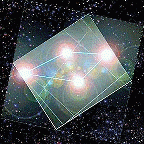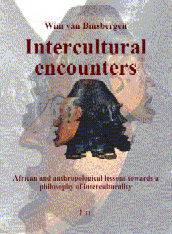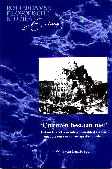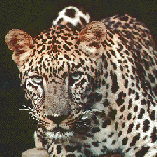| Vitae |
List of
publications |
| A researcher's photo album |
Contact information |
| 8 april 2005: op het symposium ‘Met drie
ogen: Intercultureel doordenken van de
kruisbestuiving tussen westerse filosofie en
oosterse spiritualiteit’, georganiseerd door
Henk Oosterling en Vinod Bhagwandin, Erasmus
Universiteit Rotterdam, 8 april 2005, ter
gelegenheid van het afscheid van Dr Douwe
Tiemersma van de faculteit Wijsbegeerte, Erasmus
Universiteit Rotterdam, hoopt Wim van Binsbergen
de bijdrage te presenteren: 'In de
ballingschap van het academische woord: ofwel,
scheidingen die wel mogen blijven' samenvatting: Hoewel mijn ondertitel
uitdrukkelijk verwijst naar Douwe
Tiemersma’s nieuwe boek Verdwijnende
scheidingen: Proeve van intercultureel
filosoferen (2005), zal mijn bijdrage niet
specifiek de polemiek daarmee aangaan (dat zou
niet erg feestelijk en misschien zelfs niet erg
collegiaal zijn, en bovendien, als vakmatige
discussie tussen intercultureel filosofen,
onvoldoende recht doen aan de heterogene
samenstelling van ons gehoor op dit symposium).
In plaats daarvan, zal ik mij vooral afvragen
waarom Tiemersma’s zoektocht naar
levensrelevantie voor zijn filosoferen, nu juist
een beweging heeft moeten zijn wég van de
dominante academische filosofie in Nederland
vandaan. Ik zal wat parallellen trekken met Otto
Duintjers recente werk. Ik zal constateren dat
wij ons met de academische filosofie in de
Westerse traditie onherroepelijk in de ballingschap
van het academische woord hebben begeven.
Vanuit Tiemersma’s vooral op Zuid-Azië
geinspireerde positie, op het eind van zijn
zoektocht, is het ons vergund iets van de
beperkingen van die meer algemene academische
positie te benoemen. Het is Tiemersma’s
verdienste dat hij voor ons enige alternatieven
in het zicht brengt die zich kenmerken door wat
het academische woord allemaal niet heeft: onder
meer lichamelijkheid; onmiddellijkheid in ruimte
en tijd; de suggestie van de mogelijkheid te
ontstijgen aan de regel van de uitgesloten derde;
en voorts het opgeven van de claim van een
gepriviligeerde subjectpositie waarvandaan al het
andere noodzakelijk tot object moet worden;
excentriciteit; en daarmee vooral bescheidenheid.
Verwante inzichten doemen op wanneer wij naast
die Zuidaziatische inspiratie een of meer
perspectieven plaatsen ontleend aan Afrikaanse
tradities. Maar terwijl deze excursies ver van
huis, best wel verrijkend en opwindend zijn,
hoeven wij niet noodzakelijk zo ver te gaan.
Dichter bij huis, bieden Derrida, Deleuze en
Guattari op vele plaatsen in hun oeuvre aanzetten
tot een soortgelijke relativering, vitalisering,
en herbronning van de dominante Westerse traditie
in de lijn
Aristoteles-Scholastiek-Descartes-Kant. Zelfs
Plato lijkt (bij herlezing juist van enige van
zijn meest gecanoniseerde passages) op deze
punten meer te bieden te hebben dan gesuggereerd
wordt door zijn ereplaats als de eerste Westerse
filosoof die een groot, nog bestaand oeuvre
naliet. Maar laten wij niet het kind met het
badwater weggooien: ik zal besluiten met te
betogen dat, met name in de interculturele
filosofie, aan de scheidingen die het academische
woord mogelijk maakt, toch een grote persoonlijke
en maatschappelijke relevantie en betekenis niet
valt te ontzeggen, juist in het huidige
tijdgewricht van globalisering en intercultureel
conflict.
|
|
| Papers in Intercultural
philosophy (PIP): the Fall of 2004 saw the
announcement (click here for a fuller description
(PDF)) of a new series
of books, reports and papers around the Erasmus
University Rotterdam chair of Intercultural
Philosophy. These publications will appear both
in electronic form and as printed hard copy. The
series will be published in conjunction with Quest: An African Journal of
Philosophy/Revue Africaine de Philosophie. Editorial work on the first titles is
in progress – they will appear in the course
of 2005, which is also when the new PIP website
will be established |
|
| Establishment of the website: Reticulum:
website of the Intercontinental PhD Network on
Intercultural Philosophy, around the chair of
Foundations of Intercultural Philosophy, Erasmus
University Rotterdam, the Netherlands, in
collaboration with the African Studies Centre,
Leiden, the Netherlands,
with PhD proposals, Forum, chat room, agenda's
etc: everything to ensure state-of-the-art
intercontinental communication between the
members of this network |
 |
|
|
Wim van Binsbergen, 'Towards an
Intercultural Hermeneutics of Post-‘9/11’
Reconciliation: Comments on Richard Kearney’s
‘Thinking After Terror: An Interreligious
Challenge’, paper in press in the Journal of
Interdisciplinary Crossroads1 (April, , Vol. 2, No.
2005) (click here for PDF;
and click
here for html)
|
| Intercontinental network
of PhD candidates around the chair of
Intercultural philosophy, Erasmus University
Rotterdam, in conjunction with the African
Studies Centre, Leiden: given the
difficulties of funding and of creating a
congenial and productive working environment for
intercultural philosophical research by
intercontinental PhD students in the Netherlands,
a network is being created of such students
working in university positions in their home
countries and being supervised via modern
electronic media with short annual periods of
face-to-face supervision; the PhD trajectory is
to be concluded with a few months’
stay in the Netherlands. A number of PhD students
in Africa and Asiahave now been registered under
this new scheme, and more are to follow. from 10-26 March 2005 Wim van Binsbergen
visited (1) the Universities of Yaoundé
I , (2) the Catholic
University of Central Africa at Yaounde and (3)the
University of Buea, Cameroon: in order to
supervise his locally residing PhD students, and
to deliver seminars and lectures on intercultural
philosophy and related topics; click for extensive further details
including titles of seminars, hyperlinks to the
contents presented, and many photographs
|
|
|
|
 |
'Cultures do
not exist' / 'Culturen bestaan niet' (inaugural lecture in the chair of
'Foundations of Intercultural Philosophy'),
Erasmus University Rotterdam, 1999)
revised
version now included as chapter 15 in: van Binsbergen, W.M.J., Intercultural
encounters: African and anthropological lessons
towards a philosophy of interculturality,
Berlin/Muenster: LIT
Dutch and English
text  traduzione
italiana
‘Le culture non esistono:
Critica dell’autoevidenza negli studi
interculturali’ -- Italian version of 1999 inaugural
lecture in the chair of 'Foundations of
intercultural philosophy' (Erasmus University
Rotterdam): van Binsbergen, W.M.J., 2002,
‘Le culture non esistono: Critica
dell’autoevidenza negli studi
interculturali’, in: Miltenburg, A.F.M.,
ed., Incontri di sguardi: Saperi e pratiche
dell’intercultura, Padova: Unipress/
Master in Studi Interculturali, Facolta di
Lettere e Filosofia, Universita di Padova, pp.
5-51.
|
 |
|
|
|
early 2003 Wim
van Binsbergen took over the Editorship of Quest:
An African Journal of Philosophy/ Revue Africaine de
Philosophie;
click for details
of the International Colloquium marking that event van Binsbergen, W.M.J., 1996, a., ‘Time,
space and history in African divination and
board-games’, in: Tiemersma, D., & Oosterling,
H.A.F., eds., 1996, Time and temporality in
intercultural perspective: Studies presented to Heinz
Kimmerle, Amsterdam: Rodopi, pp. 105-125
|
| Spiritualiteit
en transcendentie: Een onderzoek naar spiritualiteit
vertrekkend vanuit Otto Duintjers Onuitputtelijk is
de Waarheid: lezing door Wim van Binsbergen voor
Studium Generale en Filosofie Oost-West (2e lustrum),
Utrecht, 21 april 2004 |
The Leopard in the Garden of Eating: From food
for thought to thought for food – towards a world
history of difference', paper read at, ‘The Garden
of Eating: Experiencing the thought of Gilles Deleuze in
cultural practices’, 29 May 2004, Rotterdam:
Faculties of Philosophy / History and Art; convenor: Rick
Dolphijn ABSTRACT: Most
philosophers and cultural analysts who let themselves be
inspired by Deleuze (and Guattari’s) work
concentrate on present-day North Atlantic urban society.
Yet the scope of Deleuze and Guattari’s work was far
more extended in space and especially in time, and
particularly Milles Plateaux (1980) offers perspective on
other cultures than the North Atlantic one, and on
Palaeolithic and Neolithic cultures in the remote past.
The title of this symposium, and the apple as its central
emblem (although difficult to spot on the poster),
clearly refer to the Garden of Eden, humankind’s
mythical original paradise. I will take you to that
remotest moment in history: the genesis of humans on the
East African savanna over three millions years ago. Our
aim will be to explore whether we can discern general,
perhaps universal, patterns in human thought; trace the
unfolding of these patterns over time; interpret and
explain these patterns philosophically in a manner
inspired by Deleuze (and Guattari); and in the process
link the ‘food for thought’ theme to that of
‘thought for food’; particularly in a
philosophical reflection on the emergence of agriculture
as systematic production of food; using leopard symbolism
and speckledness as our index fossil
|
|
paper read at the symposium ‘World
views, Science and Us’, Brussels, Centre Leo
Apostel, Free University Brussels, Belgium, 10 June 2003;
now incorporated as ch. 7 of Wim van Binsbergen's book Intercultural encounters
|
van Binsbergen, W.M.J., 2003, ‘Sangoma en
filosoof: Eenheid in de praktijk, dilemma in de
theorie’, in: Bulhof, I.N., Poorthuis, M., &
Bhagwandin, V., eds., Mijn plaats is geen plaats:
Ontmoetingen tussen wereldbeschouwingen, Kampen:
Klement-Pelckmans, pp. 219-231 |
bijdrage aan het symposium ‘Wereldburger
tussen culturen in conflict’, ter gelegenheid van
het afscheid van Prof.dr U. Libbrecht van de Stichting
Filosofie Oost-West, Utrecht, 11 april 2003;
inmiddels verschenen als:
Van
Binsbergen, W.M.J., 2003, 'Grenzen en
wereldbeschouwingen: Waarom wereldburgerschap ook heden
een moeilijke opgave is', in: Stichting Filosofie
Oost-West, red., Wereldburger tussen culturen in
conflict: Symposium gehouden op vrijdag 11 april 2003 te
Utrecht, Nijmegen: Stichting Filosofie Oost-West, pp.
27-40
|
|
'The underpinning of scientific
knowledge systems: Epistemology or hegemonic power? The
implications of Sandra Harding’s critique of North
Atlantic science for the appreciation of African
knowledge systems'
paper presented at the Colloquium ‘La rencontre des
rationalites’, organised by the African Centre for
Advanced Studies, the International Council for
Philosophy and Humanistic Studies (CIPSH) and UNESCO,
Porto Novo, Benin, September 18-21, 2002 |
|
|
|
Sensus
communis or sensus particularis: Kant in Africa - A
social science comment (based on the Kazanga festival in
western central Zambia)
; revised
version included as chapter 9 in: van Binsbergen, W.M.J., Intercultural
encounters: African and anthropological lessons towards a
philosophy of interculturality,
Berlin/Muenster: LITFrom: Sensus communis edited
by Heinz Kimmerle and Henk Oosterling, 2000
|
|
|
|
| Felix
Guattari: philosophy and anthropology (Web-article) (Dutch version
with English summary) |
|
|
|
|
|
|
|
|
|
|
ICT and
intercultural philosophy: An African exploration --
English
revised
version now included as chapter 13 in: van Binsbergen, W.M.J., Intercultural
encounters: African and anthropological lessons towards a
philosophy of interculturality,
Berlin/Muenster: LIT
version included in: Van Binsbergen
& Van Dijk: Situating globality: African Agency in
the Appropriation of Global Culture, Leiden: Brill, 2003,
pp. 107-146
ICT en
interculturele filosofie: Een Afrikaanse verkenning --
Nederlands
|
Crossing cultural
boundaries: From anthropologist to sangoma in search of
an intercultural approach to health
(Compass
Newsletter 3, 2000, pp. 12-13) |
Een interview
met Wim van Binsbergen: 'Culturen bestaan niet' --
implicaties voor de multiculturele samenleving
uit: BIJEEN,
november 1999 |
|
|
|
|
|
|
 the homepage of the
Dutch-Flemish Association for Intercultural Philosophy
NVVIF has moved to: http://www.geocities.com/nvvif the homepage of the
Dutch-Flemish Association for Intercultural Philosophy
NVVIF has moved to: http://www.geocities.com/nvvif |
Sociaal-wetenschappelijke
aspecten van niet-overheidsorganisaties
(“NGO’s”) in Afrika |
| Van
Binsbergen, W.M.J., 1987, ‘Culturele dilemma's van
de ontwikkelingswerker’, in: Themanummer ‘Over
de grenzen van culturen’, ed. H. Procee, Wijsgerig
Perspectief op maatschappij en wetenschap,
27, 4, 1986-87, pp. 124-28 |
|
| |
|
| |
|





